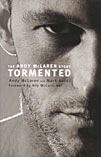 The Andy McLaren Story
The Andy McLaren Story
by Andy McLaren with Mark Guidi
Mainstream, £9.99
Reviewed by Neil Forsyth
From WSC 252 February 2008
A football autobiography that opens with the subject considering suicide then loops back to sexual abuse in childhood is going to be a more demanding read than the standard one you would expect from the genre. For Scottish player Andy McLaren, this book reflects an often calamitous past. As well as the tragic abuse, there is a staggering line of self-destructiveness through a career that should have produced more than a Scottish Cup winner’s medal.
In his youth (he currently plays, aged 34, for Ayr United) McLaren was an enchanting player – a ragged winger who played with the abandon of a kid from Glasgow’s Castlemilk estate. At Dundee United, he faced the fierce but learned tutelage of the inimitable Jim McLean, who was soon fining the youngster on a regular basis.
There is a hilarious touch. McLean sends McLaren and other young offenders to paint the gymnasium. When he arrives to inspect their work, he is faced with the daubed announcement JIM McLEAN IS A CUNT. To have seen McLean’s face would have been one of life’s great pleasures. Remarkably, he is said to have laughed.
That is relief from the book’s darker trend. Playing for United as a teenager, McLaren was already approaching alcoholism, binge drinking regularly as well as taking ecstasy. The war stories are horrific. He goes for a night out in Dundee and awakes at home in Glasgow unable to remember driving home. His wife and kids leave him and he undertakes a 72-hour bender where he eats a single packet of crisps. He pretends to be injured and endures an exploratory operation, just to gain drinking time.
And yet amid the mayhem, McLaren would often flourish. He was one of United’s best players in their momentous victory over Rangers in the 1994 Scottish Cup final. He was also the first back to the dressing room, where he knew the champagne would be. Celtic and Bolton had bids turned down, Rangers told him to sit out his contract for them, but in the end McLaren took a move to Reading to raise quick cash.
In England, cocaine was added to his vices and would be his downfall when he failed a random drugs test. He engineered an escape, settling on a £32,000 pay-off with Reading manager Alan Pardew before the results came out. After his hearing at the English FA in March 2000, McLaren bought beers for the train journey home. Shortly afterwards he made it to The Priory and, through Alcoholics Anonymous, to sobriety.
Fortunately for McLaren, he was only 27 and went on to play some of the finest football of his career at Kilmarnock and win a solitary Scotland cap. Yet this isn’t as black and white a story of redemption as that. McLaren has had problems since with gambling, depression and a temper that saw him gain three red cards in a game.
He is also back living in Castlemilk, with little stowed away from a career that is nearing an end. I hope he earns a few quid from this brave book, something he and particularly his family deserve.